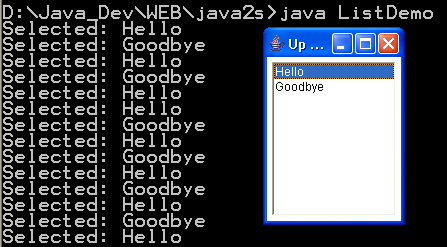| 1. | Using the Double Brace Initialization. | | |
| 2. | Add to end Performance compare: LinkList and ArrayList | |  |
| 3. | Add to start Performance compare: LinkList and ArrayList | | |
| 4. | Convert array to list and sort | |  |
| 5. | Shuffle a list | |  |
| 6. | Sort a list | |  |
| 7. | Bidirectional Traversal with ListIterator | |  |
| 8. | Int list | |  |
| 9. | Linked List example | | |
|
| 10. | List to array | | |
| 11. | List Reverse Test | | |
| 12. | Build your own Linked List class | | |
| 13. | List Search Test | |  |
| 14. | Convert a List to a Set | | |
| 15. | Set Operating on Lists: addAll, removeAll, retainAll, subList | | |
| 16. | Convert collection into array | | |
| 17. | Convert LinkedList to array | | |
| 18. | Convert Set into List | | |
| 19. | If a List contains an item | | |
| 20. | ListSet extends List and Set | | |
| 21. | List containing other lists | | |
| 22. | Helper method for creating list | | |
| 23. | Generic to list | | |
| 24. | List implementation with lazy array construction and modification tracking. | | |
| 25. | Utility methods for operating on memory-efficient lists. All lists of size 0 or 1 are assumed to be immutable. | | |
| 26. | A class that wraps an array with a List interface. | | |
| 27. | Splits the list. | | |
| 28. | Slice a list | | |
| 29. | A List that, like a Set, contains no duplicate Elements. | | |
| 30. | Determines if the given lists contain the same elements. We suppose that all the elements of the given lists are different. | | |
| 31. | List that allows items to be added with a priority that will affect the order in which they are later iterated over. | | |